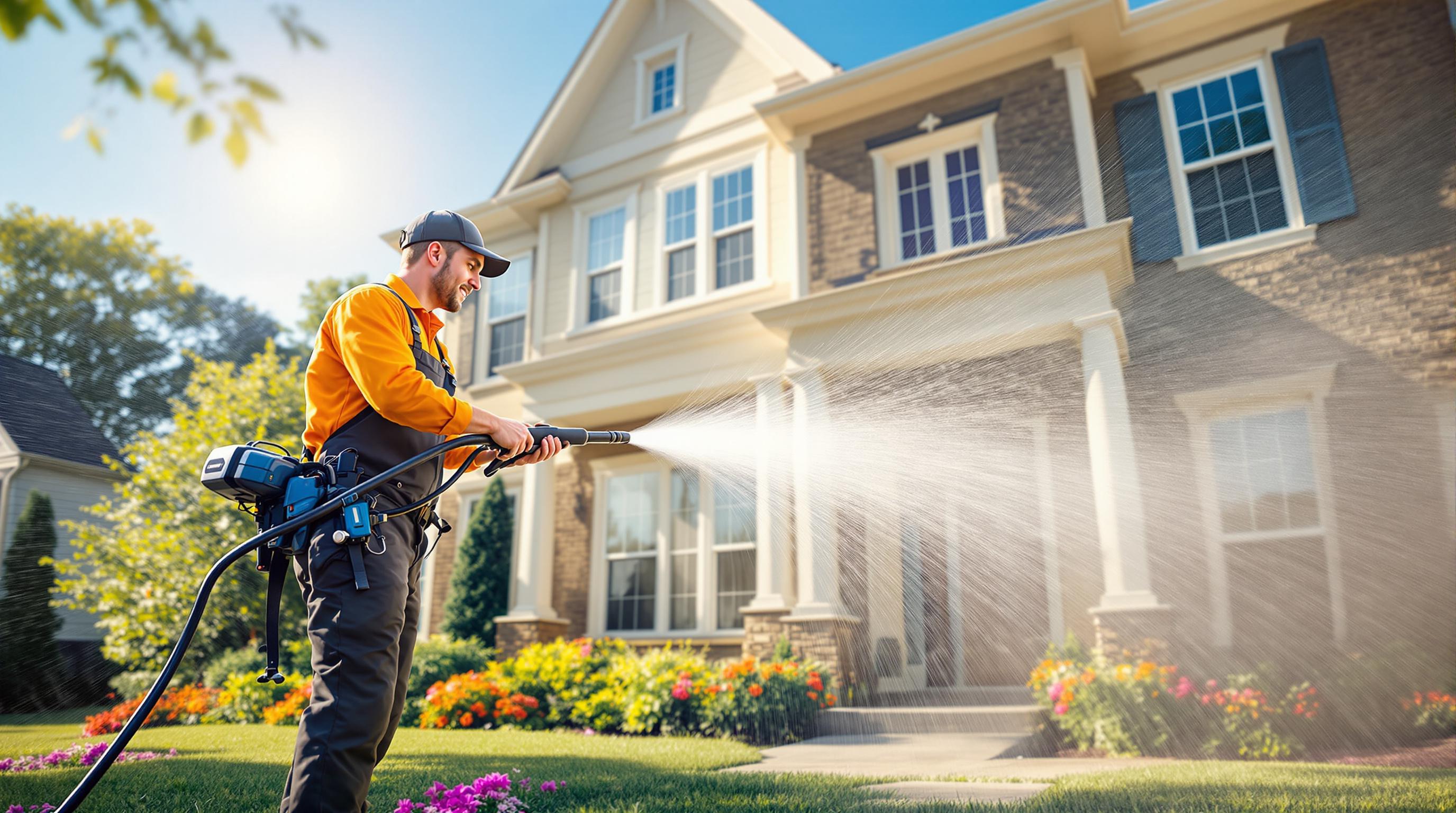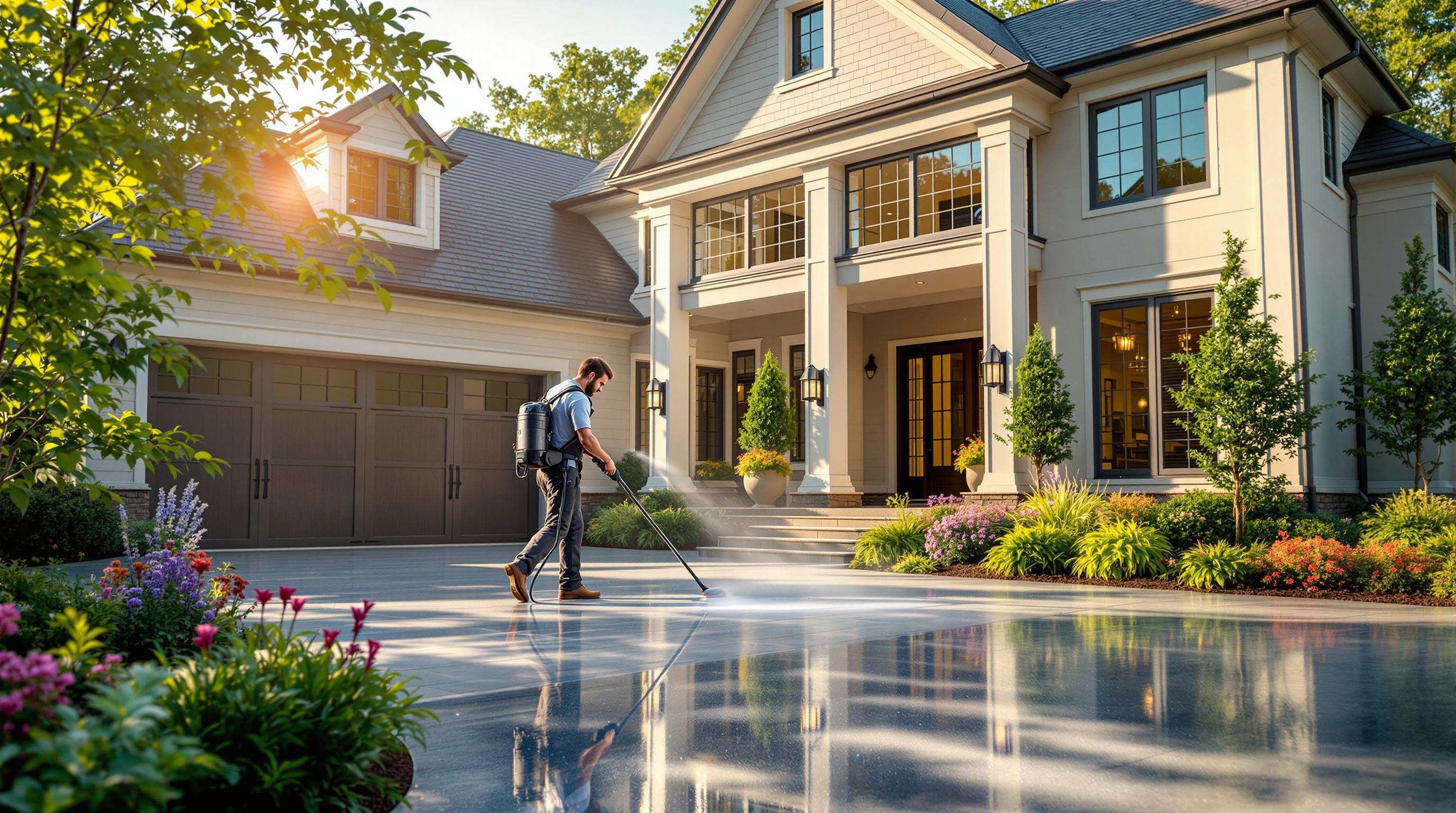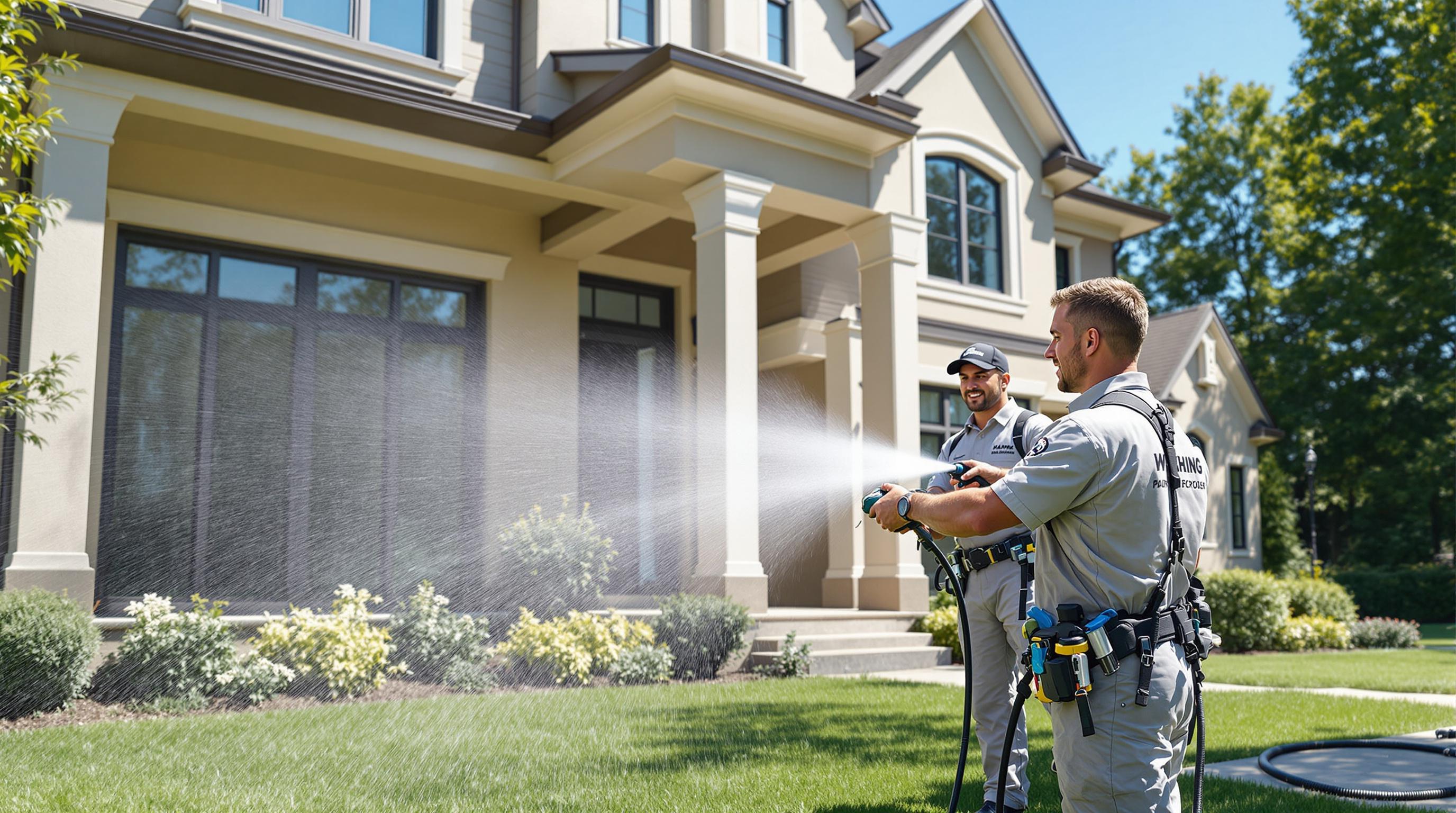Pressure washing can keep your roof and driveway looking clean while also extending their lifespan. However, using the wrong methods can cause damage. Here's a quick guide to get started:
- Roofs: Use soft washing with low pressure (under 1,000 PSI) and cleaning solutions to remove algae, moss, and streaks without damaging shingles or tiles.
- Driveways: Use high-pressure washing (1,500–3,000 PSI) to clean concrete or asphalt surfaces and remove oil stains, dirt, and mildew.
Quick Comparison
| Surface | Pressure Level | Cleaning Method | Risks |
|---|---|---|---|
| Roof | Low (under 1,000 PSI) | Soft wash (chemical-based) | Damage to shingles if pressure is too high |
| Driveway | High (1,500–3,000 PSI) | High-pressure washing | Uneven cleaning if pressure is misused |
Safety Tip: Always wear goggles, gloves, and non-slip shoes. For roofs, avoid ladders - use an extension wand instead. If unsure, hire a professional to avoid injury or property damage.
Keep reading for detailed steps, equipment guides, and safety tips to ensure effective and safe cleaning.
How to soft wash an asphalt roof | pressure washer training ...
Cleaning Methods for Different Surfaces
Here’s how to clean roofs and driveways effectively:
Roof Cleaning with Soft Wash Methods
Soft washing is ideal for roofs. This method uses low-pressure water combined with cleaning solutions to gently remove algae, moss, and black streaks without damaging roofing materials. A mix of bleach, surfactants, neutralizers, and odor removers is applied to tackle contaminants while protecting shingles. This approach not only cleans but also addresses the root causes of roof discoloration.
For tougher surfaces like driveways, higher pressure is often the way to go.
Driveway Cleaning with High Pressure
Driveways, typically made from concrete or asphalt, can handle high-pressure cleaning. Using pressure levels between 1,500 and 3,000 PSI, this method effectively removes oil stains, ground-in dirt, mildew, and other debris. To avoid uneven results, maintain a steady distance and angle with the wand. Start with a wide spray and adjust as needed for stubborn stains.
Here’s a quick comparison of the two methods:
| Aspect | Soft Wash (Roofs) | High Pressure (Driveways) |
|---|---|---|
| Pressure Level | Low (under 1,000 PSI) | 1,500–3,000 PSI |
| Primary Method | Chemical cleaning | Physical force |
| Main Benefits | Protects shingles | Removes tough stains |
| Target Contaminants | Algae, moss, streaks | Oil, dirt, debris |
| Risk Level | Low with proper use | Moderate if misapplied |
Using the right technique for driveways ensures a clean surface without streaks or patterns, leaving it both functional and visually appealing.
Equipment and Settings Guide
Once you've got the techniques down, it's time to focus on the right equipment and settings to ensure a safe and effective cleaning process.
Pressure Washer Selection and PSI Guide
Choosing the right pressure washer and adjusting the pressure settings correctly is key. For home projects, electric pressure washers are often the better choice - they're powerful enough for most tasks and easier to handle compared to gas-powered models.
Here’s a quick reference for pressure settings:
| Surface Type | Recommended PSI | Water Flow (GPM) | Comments |
|---|---|---|---|
| Roof Shingles | 500–1,000 | 2.0–2.5 | Use soft wash techniques |
| Asphalt Driveway | 2,000–3,000 | 2.5–3.0 | Start low; adjust based on condition |
| Concrete Driveway | 2,500–3,500 | 3.0–3.5 | A surface cleaner attachment helps |
| Brick/Stone | 1,500–2,000 | 2.0–2.5 | Test on a small, hidden area first |
Adjust the pressure based on the material - lower PSI for delicate surfaces like shingles and higher PSI for tougher surfaces like concrete.
Nozzles and Attachments Guide
The right nozzles and attachments can make all the difference in achieving a thorough and efficient clean.
-
Nozzle Selection
- White (40°): Great for general cleaning and rinsing.
- Green (25°): Ideal for cleaning concrete and tougher surfaces.
- Black/Blue (65°): Designed for applying cleaning solutions.
-
Specialized Attachments
- Surface cleaners create an even cleaning pattern while reducing streaks.
-
Additional Accessories
- Extension wands make it easier to reach roofs.
- Rotating brushes help tackle stubborn stains.
- Chemical injectors ensure even application of cleaning solutions.
- Quick-connect fittings simplify nozzle changes.
With the right combination of equipment and settings, you'll be ready to handle any pressure washing job efficiently and effectively.
sbb-itb-8e2a680
Pressure Washing Steps
Pre-Cleaning Checklist
Before starting, check the surface for any damage, loose materials, or areas that might need extra care. Remove furniture, plants, and decor that could be harmed by water.
Here’s what to do before cleaning:
- Remove debris and secure anything loose.
- Cover plants, electrical outlets, and drainage areas.
- Check and clean gutters and downspouts.
- Trim branches that may obstruct the process.
- Take note of any existing damage for reference.
Once everything is ready, you can move on to applying the cleaning solution.
Cleaning Solution Application
Choosing the right cleaning solution is key to getting the best results for different surfaces.
| Surface Type | Solution Type | Application Method |
|---|---|---|
| Asphalt Shingles | Soft wash solution | Black soap nozzle |
| Concrete Driveway | All-purpose cleaner | Low-pressure spray |
| Brick/Stone | pH-neutral cleaner | Bottom-up application |
Steps to apply the solution:
- Attach the black nozzle to your pressure washer wand.
- Place the detergent pickup tube into the cleaning solution.
- Apply the solution from the bottom up to avoid streaks.
- Ensure even coverage and don’t let the solution dry on the surface.
Washing Techniques and Final Steps
Once the solution has had time to work, start washing. Use steady, overlapping strokes to ensure even cleaning.
For driveways:
- Clean in sections for better control.
- Keep a consistent distance from the surface.
- Use smooth, sweeping motions.
- Rinse from the top down.
For roofs:
- Begin at the peak and work downward.
- Avoid spraying upward under shingles to prevent damage.
- Rinse each section as you go.
Finish by thoroughly rinsing off all solution residue. Let everything dry completely before putting furniture or decor back in place.
Safety Guidelines
Safety Equipment and Usage
Always wear safety goggles (or a face shield), steel-toe boots, waterproof gloves, long pants, and non-slip shoes. This is especially important because water jets at 1,160 PSI can cut through skin.
When using a pressure washer, start with the widest-angle spray tip (a 40° white tip) to test how the surface reacts. This helps you avoid unintentional damage while figuring out the right pressure level.
| Nozzle Color | Spray Angle | Best For |
|---|---|---|
| White | 40° | Testing, light cleaning |
| Green | 25° | General cleaning tasks |
| Yellow | 15° | Removing tough stains |
| Red | 0° | Focused, pinpoint cleaning |
Working Conditions and Precautions
In addition to wearing the right gear, always evaluate your surroundings before pressure washing. Weather plays a big role in safety - choose a clear day with good visibility and avoid working during rain or strong winds.
For roof cleaning, skip the ladder. Use an extension wand to safely reach high areas. Falls, even from just 3 feet, can result in serious injuries if you land the wrong way.
Before starting, follow these key precautions:
- Do a quick safety check of the work area.
- Cover electrical outlets and components with waterproof materials.
- Close nearby windows and seal vents.
- Remove obstacles and trip hazards from the workspace.
- Inspect all equipment connections and hoses for any damage.
If you're using a gas-powered pressure washer, ensure the area is well-ventilated. Never operate it in an enclosed space, as carbon monoxide buildup can be life-threatening.
Professional Service Guidelines
Signs You Need a Professional
While tackling pressure washing on your own might sound tempting, it comes with serious risks. High-pressure equipment can cause injuries and significant property damage. Misuse can strip paint, harm siding, or even shatter windows. Plus, renting equipment and purchasing specialized cleaning solutions often ends up costing more than hiring a professional.
You should think about hiring a professional if:
- There's a risk of injury from using high-pressure equipment.
- You could damage your property with excessive pressure or improper chemicals.
- The task demands more time and resources than you can spare.
"The primary reason we cannot recommend homeowners pressure wash their own home is due to the potential for a major injury to occur. A power washer creates intense amounts of pressure that might lead to a major injury if it contacts skin or clothing."
When deciding between DIY and professional services, here’s a quick comparison:
| Factor | DIY Approach | Professional Service |
|---|---|---|
| Equipment Cost | Up to $100 per weekend + chemicals | Included in service |
| Time Investment | Full day or more | Typically 2–4 hours |
| Risk Level | High | Fully insured |
| Results | Variable | Consistent, professional |
These risks and considerations make hiring experts a smarter and safer choice.
Pressure Washing Cary NC Services
Using the right equipment and techniques is crucial for safe and effective pressure washing. Professional services excel in this area, offering the expertise needed to safeguard your home. Their services include:
- Techniques tailored to specific surfaces, like roofs and driveways.
- Industrial-grade washers with precise pressure controls.
- Eco-friendly, biodegradable cleaning products.
Some key benefits of hiring professionals are:
- Training and experience in handling pressure levels and cleaning solutions.
- Special methods for delicate surfaces to avoid damage.
- Savings on time and costs compared to renting equipment.
- Insurance coverage to protect against accidental damage.
- Expert evaluations of surface conditions before cleaning.
For valuable parts of your home, like the roof and driveway, trusting professionals ensures quality results and peace of mind.
Maintenance Tips and Summary
Once you've got the cleaning techniques and safety measures down, keeping up with regular maintenance is crucial for lasting results. Consistent cleaning helps preserve the look and condition of your roof and driveway in Cary, NC. Over time, dirt and grime can build up, wearing down your home's exterior. Scheduling routine professional pressure washing can help prevent this buildup and safeguard your property.


